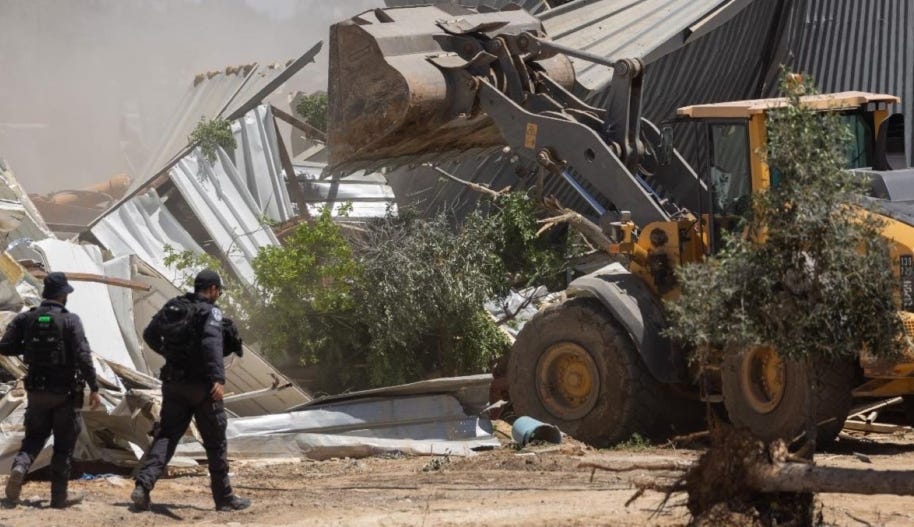Israelis Demolish Bedouin Village in Wadi al-Khalil, Ethnically Cleansing 100 People.
Demolition of 47 homes, carried out without prior warning, marks the latest chapter in an ongoing struggle between Bedouin communities and the Israeli government over land rights.
In a sudden and unexpected move, Israeli authorities demolished the Bedouin village of Wadi al-Khalil in the Negev desert on Tuesday, leaving its residents displaced and without shelter. The demolition, which was carried out without prior warning, marks the latest chapter in an ongoing struggle between Bedouin communities and the Israeli government over land rights

According to eyewitnesses, Israeli police and bulldozers arrived at the village early in the morning and proceeded to demolish all of the structures, including homes, animal pens, and a mosque. The residents, who were given no time to gather their belongings, were left to watch as their homes were razed to the ground.
The village, which was home to around 100-300 people, was one of dozens of Bedouin communities in the Negev that are considered "unrecognized" by the Israeli government. This means that they are not connected to the national water or electricity grids, and are at constant risk of demolition.
The residents of Wadi al-Khalil have been fighting for years to have their village recognized by the Israeli government, but their efforts have so far been unsuccessful. In 2015, the Israeli Supreme Court rejected a petition by the villagers to have their land recognized as their own, paving the way for Tuesday's demolition.
The demolition of Wadi al-Khalil has been widely condemned by human rights groups, who say that it is part of a broader pattern of discrimination against Bedouin communities in Israel.
"The demolition of Wadi al-Khalil is a blatant violation of the residents' human rights, and a clear example of the Israeli government's ongoing efforts to displace Bedouin communities from their land," said a spokesperson for the Negev Coexistence Forum, a group that advocates for Bedouin rights.
The Israeli government has defended the demolition, saying that it was carried out per the law. In a statement, the Israeli Ministry of Foreign Affairs said that the village was built illegally on state land and that the residents had been offered alternative housing solutions.
However, the residents of Wadi al-Khalil say that they have nowhere else to go, and that the demolition has left them homeless and without hope.
"We have been living here for generations, and this is our land," said one resident, who asked to remain anonymous. "We will continue to fight for our rights, and we will not give up until we have a place to call home."
As the struggle for land rights in the Negev continues, the demolition of Wadi al-Khalil serves as a stark reminder of the challenges facing Bedouin communities in Israel, and the urgent need for a just and lasting solution.




